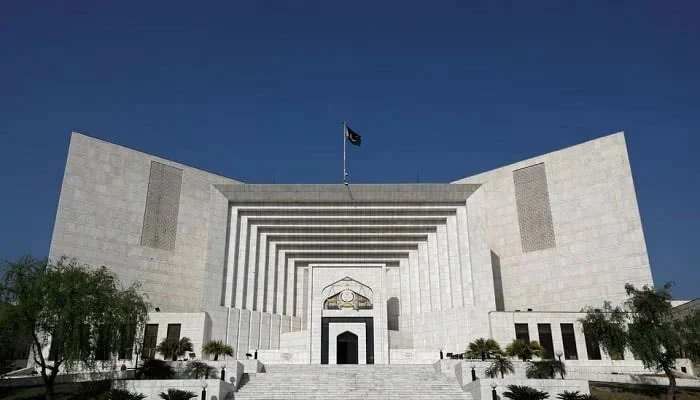ISLAMABAD: The Supreme Court on Wednesday by a 5-1 majority suspended its October 23 order wherein it declared civilians’ trials in military courts null and void in connection with the May 9 riots.
The verdict was announced on intra-court appeals filed by the federal and provincial governments and the defence ministry against the top court’s verdict announced by Justice Ijazul Ahsan-led bench in October this year.
A six-member bench of the Supreme Court, headed by Justice Sardar Tariq Masood and comprising Justice Aminuddin Khan, Justice Muhammad Ali Mazhar, Justice Syed Hasan Azhar Rizvi, Justice Musarrat Hilali, and Justice Irfan Saadat Khan heard the set of intra-court appeals.
Justice Hilali differed with the majority verdict that allowed the trials of civilians in the military courts till the Supreme Court announced the final verdict on the intra-court pleas.
The military court trials will be conditioned on the Supreme Court’s final verdict on the intra-court pleas, the court order stated.
On October 23, a five-member apex court bench headed by Justice Ahsan unanimously admitted the pleas and nullified the government’s decision to try civilians in military courts in connection with the May 9 riots which erupted after the arrest of Pakistan Tehreek-e-Insaf (PTI)-then chairman Imran Khan.
Four judges out of the five declared that Section 2(1)(d) of the Army Act and 59(4) (civil offences) are “ultra vires the Constitution and of no legal effect”.
“Without prejudice to the generality of the foregoing the trials of civilians and accused persons, being around 103 persons […] shall be tried by criminal courts of competent jurisdiction established under the ordinary and/or special law of the land in relation to such offences of which they may stand accused,” the short order read.
Following its verdict, the federal and the provincial governments along with the defence ministry filed intra-court appeals (ICAs). However, the caretaker government of Sindh refused to file any plea against the SC order.
During the hearing today, Khawaja Haris, a counsel for the defence ministry, requested the top court to stay the military verdict until the final decision on the intra-court pleas.
The hearing
At the outset of the hearing, Justice Masood refused to recuse himself from the six-member bench after objections were raised on his inclusion.
On Monday, the top court was moved against the inclusion of Justice Masood’s inclusion in the bench slated to hear the intra-court appeals against the top court’s October 23 verdict.
Former chief justice of Pakistan Jawwad S Khawaja, in his petition filed on Monday, contended that Justice Masood had already expressed his views on the said matter via his written note and so must recuse himself from the bench from hearing the pleas filed against the SC verdict.
“Did anyone issue a notice to you?” asked Justice Masood from the counsels of the parties.
At this, lawyer Ahsan said arguments were held before issuing notice if there was an objection from judges.
Attorney General Mansoor Usman Awan said the objection of the parties’ was baseless.
He said that the case should be heard on merit first and objections can be raised after the notice.
At this, Lawyer Salman Akram Raja said the case would be affected by objecting to the notice.
Later, Justice Masood said: “I will not recuse myself from the bench.”
Lawyer Sardar Latif Khosa then objected to Justice Masood saying “How can you hear the case with our objections?”
AGP Awan then questioned how can the court consider the objections when the notices had not been issued on the ICAs yet. “The one who objected is himself not present in the court,” he added.
During the hearing, lawyer Faisal Siddiqui — the counsel in pleas filed by civil society members — asked how the federal government appoint private lawyers.
To this, AGP Awan replied that all legal requirements for the services had been fulfilled and urged the court to first hear the petitioners who had filed the intra-court appeals.
Following this, Balochistan Shuhada Forum’s lawyer started his arguments.
Justice Mazhar told the lawyer that he would have to amend the appeal after a detailed order was issued.
Defence ministry counsel Khawaja Haris then said that the Army Act’s Section 2(1) was amended in 1967 which allowed military trials of the civilians.
He argued that through this Act, those who attacked and looted military installations are being tried in the military courts. “The court invalidated the provisions of the Army Act by a majority of 4-1,” he added.
Citing the previous case of retired Brig FB Ali, Haris said that these provisions were upheld in this case, adding that the judgment was declared as correct when hearing a case on the 21st Amendment.
Haris said that those civilians who are a threat to national security will be tried in the military court.
Justice Saadat remarked that it would be appropriate to wait for the detailed verdict.
At this, Haris said that the October 23 court order should be suspended if they have to wait for the detailed verdict.
“About 104 people have been in army’s custody for the last seven months. It would be appropriate for the accused to complete their trial,” said Haris.
The court asked whether the trials were completed. To which the AGP said that some of them were indicted and some are pending, adding that some of the accused may be acquitted.
AGP Awan said that those who are indicted will not face a sentence of more than three years.
“How do you know that the sentence will be less than three years?” asked Justice Mazhar.
In the case of minimum sentence, the incarceration period will also be part of the punishment awarded to any accused, the AGP said.



Comments are closed.